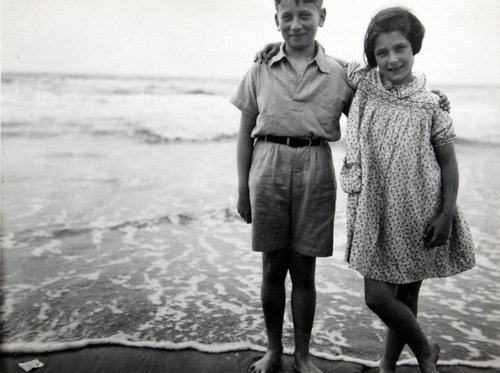Excerpt from Shores Beyond Shores
Chapter 2
Berlin, Germany
Winter 1937
Adolf Hitler had now been the Führer, or leader, of our country for four years. He liked people he said were true Germans. He said they were better than all other people, and if they stayed pure—didn’t mix with other peoples—they would take over the world some day. According to Hitler, people who were not pure German were less perfect, and he didn’t like them. He said they made a mess of things, like a big smudge on his white tablecloth. This meant lots of people, including Jews like us.
Fear spread like spilled hot chocolate, burning everything it touched. My Opa had worked his whole life building a bank and was now forced to turn it over to someone who was not Jewish. My Pappi also worked in that bank.
One night, as I used the bathroom before bed, I saw Mutti crying. I didn’t like to see my parents cry, and I looked away. Pappi came t tuck me in.
“I won’t be taking the tram to work anymore, Reni,” he said, smoothing my hair. “I will not be going to work…for now.”
I was glad to hear that my parents were not upset with something I’d done.
“Does that mean you’ll be home when I get home from school?” I asked.
“Yes, I will be home with you, for a little while, but I need to find another job,” he said.
“So why is Mutti sad?” Being home more seemed good to me.
“She’s sad because finding another job might be hard. But I am going to try very hard to find one, and I bet I will.”
“Okay.”
“Go to sleep now, sweetie, everything will look better with the morning sun.” He kissed my hair lightly.
Look better? I didn’t think things looked bad. Something else must be wrong.
A few nights later, Mutti forgot to read to me. Then, listening from my bed, I heard my parents talking in fast, sharp whispers, keeping me awake. I couldn’t hear the words, only the tone. Werner moved in his bed.
“Why are they fighting?” I whispered to him.
“I don’t know.”
We both crept to the door. I wasn’t cold, but I brought my pink blanket. Mutti and Pappi’s words flowed down the hall from the living room. I wrapped my blanket around me, and even draped it over Werner.
“Even my friends have turned on me,” Pappi’s voice said. “On us. And these include the men I fought with in the Great War! How in God’s name can they not help us? We lived and died in those…those terrible trenches, and fought side-by-side for our…for this country, our Fatherland! Together! And now they won’t help. It’s unbelievable. Even Frank will not get back to me. Frank!”
He ended with a snarl that made me shiver.
“John, quiet, we don’t want to wake the kids.” Mutti said. “I know it isn’t fair. It isn’t right.”
“Don’t they know that we’ve ALWAYS been Jewish? Now. During the Great War. Forever. When did we suddenly become evil?”
I had never heard Pappi yell before.
“John, please. I know, I know.” Pause. “What about Charles? Have you spoken to him?”
“It’s the same, Trudi,” he said in a softer voice. “I stopped by his office, but he wouldn’t see me. I know he was there. Everybody is acting strange, even if they aren’t Nazis. They are afraid. They are suspicious. It’s spreading like a plague.”
“There’s still Leo.”
“Yes, there’s always Leo, but he’s in the same situation as us. In fact, he mentioned he’s thinking of moving the family to Holland.”
Leo was my father’s best friend in the war. There was a photo in Pappi’s study of them standing arm-in-arm, in their smart officer uniforms.
“Maybe we should go, too. There are more anti-Jewish graffiti and posters,” Mutti said. “When I go shopping. When I walk to the post office. It’s terrifying. The children see them.”
“Trudi, there are more terrifying things to be worried about now.”
He lowered his voice, and I strained to hear it. “Some of the bank tellers heard that they are gathering Jews, whole families, and sending them on trains to labor camps. Rumor is that it’s happening in some neighborhoods in Berlin.”
I tapped Werner on the shoulder and whispered across the smooth hardwood floor. “What are they talking about? The camps. The posters.
And what’s graf …?
“Graffiti. It’s like drawing bad doodles on buildings.”
“Really?”
“And I saw one of the posters. It had a spear killing a snake, and the snake had our Star of David on it.”
I didn’t know there were Jewish snakes. I didn’t like any kind of snake. Yuck.
“My friends at school heard about trains going to the camps, too,” Werner said.
Whenever we got on a train, it was for vacation, or to go someplace different and fun.
“Why would people get on a train going to a bad place?” I asked.
“They don’t have a choice.”
“Who makes them?”
“The people that run our country, Reni. The Nazis.”
“The Nazis sound mean.”
“They don’t like anybody who is not like them.”
“Who’s that?”
“Anybody not Aryan.”
“What’s Aryan?”
“Reni! You ask too many questions. Aryans are German. Tall. Blond. Blue-eyed.”
“We’re German! And I have blue eyes!”
“It doesn’t include us.”
“But why?”
“Because we’re Jewish. Don’t you listen to anything?”
It didn’t make any sense to me, but Nazi sounded like a mean word, a word that could cut you. And getting on a train to a bad place didn’t sound like a vacation at all. We listened to our parents’ talk float in and out until I was too tired. I left, bringing my blanket with me, and leaving Werner to listen and worry.
